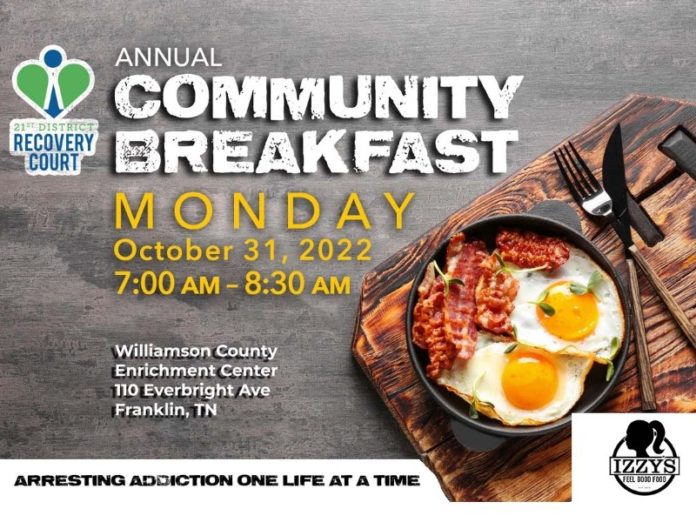The 21st District Recovery Court (Recovery Court) Board of Directors is hosting their 11th Annual Community Breakfast on Monday, Oct. 31 from 7:15 – 8:30 a.m. at the Williamson County Enrichment Center located at 110 Everbright Ave. in Franklin.
The breakfast – which serves as one of the nonprofit’s two annual fundraisers – supports Recovery Court’s alternative sentencing program in the 21st Judicial District. Recovery Court allows local nonviolent offenders, who suffer from addiction issues, the opportunity to complete an intensive two-year, court-supervised recovery program instead of, or in addition to traditional sentences. “Our program is not an easy way out,” said Program Director Connie Martin. “The court only considers applicants demonstrating a genuine desire to confront their addictions. Those that are accepted undergo rigorous treatment and intensive monitoring as they learn life skills and new habits for successful living. Our model is unique in that it uses a non-adversarial, therapeutic approach to crimes rooted in addiction.”
According to local law enforcement professionals, the vast majority of crime committed in our community is drug or alcohol related. The program has proven effective in reducing the revolving door of drug and alcohol related crime as well as reducing the cost to taxpayers. Recovery Court spends approximately $12,500 per participant annually compared to nearly $35,000 to incarcerate each offender for a year. While each successful participant saves the county money, the program does not receive taxpayer funding from the counties.
“We know recovery courts reduce crime and save taxpayers money by keeping non-violent offenders out of jail,” said Lacie Simonton, 21st District Recovery Court board president. “The annual breakfast is a time for the community to hear directly from participants how the program has changed their lives and for the community to learn how they can support the program.”
The breakfast program will honor Judge James (Jim) G. Martin with the “Gayle Moyer Harris” award, named after one of the Recovery Court’s founders. Judge Martin recently concluded eight-years of presiding over Recovery Court. “I wish this room were large enough to accommodate all the participants that have been through the court since Sept. 1, 2014, while I have been privileged to preside,” Martin shard with graduates in August. “If that were true, then I could tell everyone in this room how much it’s meant to me. I thought I had worked hard as a lawyer and a judge, but the work I did pales in comparison to the work you do.”
Serving as the program emcee will be Joe Fisher, the veteran sports broadcaster is an announcer for Nashville Sports Radio and spent 23 years as the voice for Vanderbilt athletics including football, men’s basketball and baseball. In addition to hearing from Recovery Court graduates, Fisher will share his story of recovery.
Recovery Court was established in 2002 under a three-year startup grant from the U.S. Department of Justice and is now funded primarily through grants and private donations. Recovery Court participants also pay modest participation fees every week. Since 2004, more than 250 participants have graduated from the two-year program.
Seating is limited. Please RSVP to Connie Martin at [email protected] by Oct. 23. Those who would like to support Recovery Court but cannot attend the breakfast may make an online donation at: https://21stdc.org/donate/. For more information, visit 21stdc.org or call 615.595.7868.
About 21st District Recovery Court
The 21st Recovery Court serves the 21st Judicial District (Williamson, Hickman, Lewis and Perry Counties). Program participants are non-violent offenders with a history of chemical dependency, which has shown to be one of the primary reasons for repeated criminal activity. The program works with law enforcement and the courts as participants engage in a highly supervised, two-year program, providing treatment, supervision and support. Graduates of recovery court programs have a low rate of reoffending, especially compared to those offenders supervised in traditional court probation and parole programs. Participants’ recovery allows them to have a productive life while the community is served by a reduction in criminal activity and cost-effective treatment for offenders. Most importantly, the families and lives of the participants are restored to a safe and positive environment. Recovery courts in Tennessee are not supported by state judicial budgets, rather they are partially funded by a portion of statutory court costs paid by criminal offenders. For more information, visit 21stdc.org or call 615.595.7868.



















